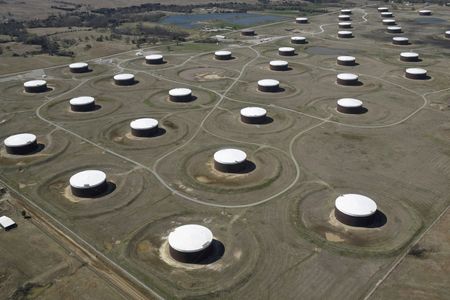By Shariq Khan
BENGALURU (Reuters) -Oil prices settled 1% higher on Thursday, extending a recent rally built around rising Chinese demand, while the market wrote off a second straight week of large builds in U.S. crude inventories.
Brent crude futures gained $1.18, or 1.4%, to settle at $86.16 per barrel, while U.S. West Texas Intermediate (WTI) crude futures rose by 85 cents, or 1.1%, to settle at $80.33 per barrel. Those were the highest closing levels for both contracts since Dec. 1.
Chinese oil demand climbed by nearly 1 million barrels per day (bpd) from the previous month to 15.41 million bpd in November, the highest level since February, according to the latest export figures published by the Joint Organisations Data Initiative.
Energy markets could be tighter in 2023, especially if the Chinese economy rebounds and the Russian oil industry struggles under sanctions, International Energy Agency (IEA) head Fatih Birol said on Thursday.
Oil prices were down by more than a dollar per barrel earlier in Thursday’s session, as traders booked profits and U.S. data showed the economy losing momentum. Both oil benchmarks hit their highest level in more than a month on Tuesday.
Prices also came under pressure briefly after U.S. Energy Information Administration (EIA) data showed U.S. crude stocks last week rose by 8.4 million barrels, their biggest gain since June 2021.
UBS analyst Giovanni Staunovo described the EIA data as a “bearish report, with large crude and gasoline inventory increases, but an improvement from last week, with a recovery of implied oil demand and refinery runs from the impact of Storm Elliot.”
U.S. gasoline refining margins traded at a new five-month high for the fourth straight session on Thursday, amid optimism about rising travel demand from China’s reopening and threats to refined products supply from strikes in France.
“All roads seem to lead back to the same input – rising Chinese demand,” said John Kilduff, partner at Again Capital LLC in New York.
“There’s just so much bullish sentiment out there, so much fear, that it keeps underpinning this market.”
(Reporting by Shariq Khan, additional reporting by Noah Browning, Ahmad Ghaddar, Sonali Paul and Emily Chow;Editing by David Goodman, Elaine Hardcastle and Paul Simao)

